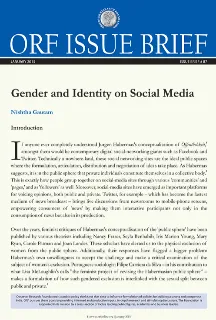If anyone ever completely understood Jurgen Habermas’s conceptualisation of Öffentlichkeit, amongst them would be contemporary digital social-networking giants such as Facebook and Twitter. Technically a nowhere-land, these social networking sites are the ideal public spaces where the formulation, articulation, distribution and negotiation of ideas take place. As Habermas suggests, it is in the public sphere that private individuals constitute themselves in a collective body.
This is exactly how people group together on social-media sites through various ‘communities’ and ‘pages,’ and as ‘followers’ as well. Moreover, social-media sites have emerged as important platforms for voicing opinions, both public and private. Twitter, for example – which has become the fastest medium of news broadcast – brings live discussions from newsrooms to mobile-phone screens, empowering consumers of ‘news’ by making them interactive participants not only in the consumption of news but also in its production.
Over the years, feminist critiques of Habermas’s conceptualisation of the ‘public sphere’ have been published by various theorists including Nancy Fraser, Seyla Benhabib, Iris Marion Young, Mary Ryan, Carole Patman and Joan Landes. These scholars have alerted us to the physical exclusion of women from the public sphere. Additionally, their responses have flagged a bigger problem: Habermas’s own unwillingness to accept the challenge and make a critical examination of the subject of women’s exclusion. Portuguese sociologist Filipe Carriera da Silva – in his contribution to what Lisa McLaughlin’s calls “the feminist project of revising the Habermasian public sphere” – makes a formulation of how such gendered exclusion is interlinked with the sexual split between public and private.
It is within this context that this Issue Brief looks at digital public spaces to observe the process of identity formation, its occasional bifurcation, and even the obfuscation of the same, in the context of gender-specific issues. The paper limits itself to women-centric concerns, as any discussion on alternate sexual identities is a complex one and merits a separate study. The issues analysed in this paper include: the politics of silencing women; propriety; social media; and health and gender specific vulnerabilities.
The views expressed above belong to the author(s). ORF research and analyses now available on Telegram! Click here to access our curated content — blogs, longforms and interviews.

 PDF Download
PDF Download



 PREV
PREV

